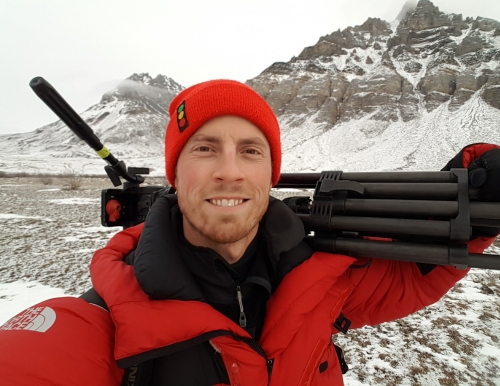After three-and-a-half years of working in the frozen and remote wilderness of Alaska — operating a camera for the BBC TV show “Life Below Zero” — USM alumnus David Lovejoy ’10 is enjoying some career heat.

In September, the camera operator from Oakland, Maine won an “Outstanding Cinematography for a Reality Program” Emmy Award for his work on the show. And he is preparing to return to the Arctic as a director of photography, once again chronicling the lives of a few sturdy souls in the dangerous but beautiful setting.
“I’m over the moon,” Lovejoy said in a phone interview. “I get an opportunity to see things that I probably would never see any other way.” They include watching grizzly bears roam the wild and the northern lights dancing across the sky.
Earning a gold statue and the designation of “Emmy winner” at the Los Angeles event was just icing on the cake.
“I couldn’t believe how lucky I was, and how the stars aligned to get me there,” he said.
His years of hard work helped.
At USM, Lovejoy majored in Media Studies. He learned the basics of production and photography and found work as a student.

“USM really helped me with work to learn the meat and potatoes, as (Professor) David Pierson likes to call it,” Lovejoy said. Professors helped him get internships with local professional projects. He worked as a production assistant and an extra, something his professors helped happen.
“They had great connections,” Lovejoy said. He even got student work on the low-budget theatrical movie “See Girl Run,” starring Adam Scott of “Big Little Lies” and “The Good Place.”
“I drove Adam Scott around downtown Portland, moved things in and out of the set, kept people from wandering in there and I was an extra if they had a scene in a bar or another public place,” he said.
After graduation, he picked up work and built a resume. Then, while working on a project in North Carolina, a friend told him about “Life Below Zero.”
The show was looking for his blend of production and back woods experience.
“My dad was a real outdoorsman and took my brother and me camping quite a bit,” he said. “I have always been doing that on my own over the years.”

Soon, he was working at an office in downtown Anchorage and venturing out into the state’s remote corners: among native villages along the Yukon River or north to the town of Deadhorse on the Arctic Ocean.
“It’s intense,” Lovejoy said. “You have to have the right kind of attitude.”
All need to be hikers and campers. You have to enjoy staying in tents and being in beautiful areas but being cold all the time.”
As the name implies, the cold is extreme and comes with unique challenges.
“It’s all the basic stuff you’d experience normally, but it’s just turned up to an extreme,” he said. “There’s more danger. You have to pay more attention. I just found it so fascinating to try and be ready and engage with that environment.”
Just hiking can be a struggle, even with the right gear.
“The coldest temp I have experienced was 35 below,” he said. “You’re hiking up mountains and you get hot, but it’s so cold outside that you really can’t expose too much to the outdoors or the air itself.”
The equipment also struggles in the cold.
Caring for camera batteries means tucking them in clothing, sometimes with a few hand warmers. “When the batteries are cold, that’s where you get the loss of performance you dread.”
It gets worse at about 30 below.

“At a certain point, almost all our equipment breaks down,” he said. “The cameras’ LCD screens begin to malfunction. They kind of have this ghosting effect where everything is sort of delayed and you can’t see what you’re filming.”
The challenges are eased by the beauty. And though there is concern about wildlife — each team on the show is accompanied by a safety worker with a rifle — Lovejoy said he has never been scared on the ground.
The bush planes used to take him to the remote locales can be frightening though. In one instance, he was startled when the plane he was riding in lurched suddenly and climbed.
“A saw a flock of geese flying 5 or 10 feet from the airplane,” he said. “Just like that we could have been in a lot of trouble.”
It all feels worth it when he’s home visiting with friends, chomping on his favorite greasy burger or merely spending time alone and warm in Los Angeles, where he lives.
It also felt worth it when he climbed onto the stage at the Emmys. The award went to eight people from his show, six of whom were beside him on stage.

“Few moments in my life have been so exciting,” Lovejoy said. One the senior people from his show made a speech representing the team.
“All you see are lights and a few people staring there,” he said. “I tried not to look too uncomfortable or embarrass myself or the show while we were in front of the world.”
In the auditorium, he glimpsed a couple of celebrities (filmmaker Judd Apatow and Science Guy Bill Nye), drank champagne and took home his gold trophy in a specially made wooden box with a silk liner.
He didn’t savor it for long.
“I was on a plane the very next day to go back to work,” he said.

